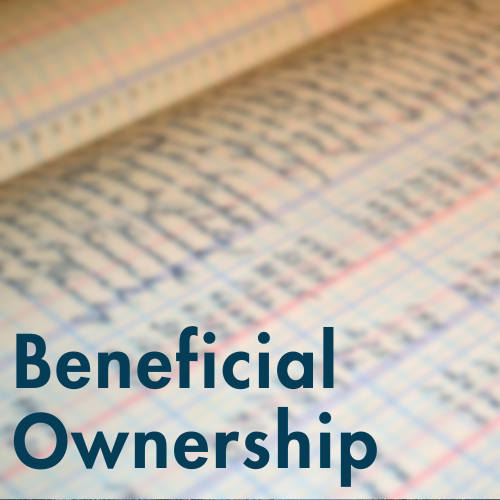Beneficial Ownership refers to the natural person(s) who ultimately own, control, or benefit from a legal entity or asset. This may be the same individual(s) as the legal owner an entity or asset, but not necessarily. In practice, the legal owner listed on paper may be different from the beneficial owner, meaning the real decision-maker remains hidden from view.
In fisheries, vessel ownership transparency is assumed to be critical for combating illegal, unreported, and unregulated (IUU) fishing, enforcing regulations, and protecting marine ecosystems. Without knowing who is truly behind a vessel, efforts to hold the actors accountable often fall short.
Before we explain why that is, an introduction to the key definitions:
Legal Owner: the entity or individual(s) formally registered as the owner
Ultimate Beneficial Owner (UBO): The natural person(s) who ultimately profit from or control the asset, even though complex structures like shell companies or trust.
Ultimate Beneficial Owners are often the true decision-makers behind a vessel’s operations. In any case, they are the ones who financially benefit from its activities, including, in some instances, from IUU fishing. That’s why it is essential to focus enforcement efforts on those who genuinely profit from fishing vessels, to ensure that sanctions are applied more fairly and effectively. Only by doing so can we begin to address the impunity that currently allows IUU fishing to persist.
Work by the Financial Transparency Initiative highlights this intersection of ownership structures and IUU fishing. It finds that weak beneficial ownership transparency enables criminal networks to use shell companies, undermining port controls and sanctions. This enables the continued existence of IUU fishing. The consequences are far-reaching: IUU fishing drains $11.49 billion annually from Africa alone, exacerbating food insecurity in climate-vulnerable regions.
In a 2025 Marine Policy article “Unveiling the hidden hands: Analysis of corporate ownership of industrial tuna fishing vessels, it was revealed that ownership data serves several vital purposes:
- Accountability: Knowing who really owns vessels, licenses, and fishing rights is essential for holding perpetrators responsible when violations occur, whether related to fishing laws, labor standards, or financial crimes.
- Monitoring Competition and Market Concentration: Ownership transparency helps managers detect when a few companies or individuals are gaining too much control, which can distort competition and signal problematic industry consolidation, such as shareholder dominance or vertical integration.
- Equity Concerns: In some fisheries, especially where distant-water fishing (DWF) companies operate, ownership data can highlight inequities, like local communities losing access to resources or wealth flowing out of the region.
In sum, vessel ownership transparency may be a key driver for a more responsible and equitable fisheries sector. Ultimately, we hope such targeted approaches will help deter illicit activities at sea, safeguarding both coastal communities and the health of our oceans.
Interested in learning more? We recorded a podcast episode with lawyer Pieter van Welzen to talk about State responsibility in the context of (hidden) vessel ownership and IUU-fishing (Illegal, Unreported and Unregulated Fishing). We discuss what happens when vessels operating under ‘Flags of Convenience’ participate in IUU-fishing or otherwise cause environmental harm? Can improved ownership transparency and increased vessel owner State responsibility be the solution here?


Leave a Reply